On October 31, 2025, the Mekong CREATES Agrifood Systems Forum 2025 was successfully held at Vietnam National University of Agriculture (VNUA), Hanoi.
The event was co-organized by the Microbiology and Food Safety Research Group, VNUA, and the Mekong Institute (MI), with the support of the New Zealand Ministry of Foreign Affairs and Trade (MFAT).
As part of the Mekong CREATES Project, implemented across Cambodia, Lao PDR, Myanmar, and Vietnam, the forum served as a national platform for dialogue and knowledge exchange, promoting the transformation toward inclusive, climate-smart, and food-safe agrifood systems, in alignment with the GMS-2030 Strategy.
The forum brought together representatives from key government agencies including the Ministry of Agriculture and Environment, Ministry of Industry and Trade, and Ministry of Health, along with international organizations such as the Mekong Institute, Alliance of Bioversity International & CIAT, Raiffeisen Confederation (Germany), CARE International.
Also present were researchers from various VNUA faculties including Faculty of Economics and Management, Accounting and Business Management, Natural Resources and Environment, and Food Science and Technology, as well as innovative agribusinesses and cooperatives including DFARM, AnTo Tea - Hibiso, SADU, Udata JSC, Van Duc Safe Vegetable Cooperative, Nguyen Đinh Viet Cooperative and Gia Lam Commune Farmers’ Association.
In her opening remarks, Dr. Orn-uma Polpanich, Director of Agricultural Development and Commercialization at MI, expressed her delight in collaborating with VNUA to advance regional cooperation toward safer and more sustainable agrifood systems. She emphasized that “Mekong CREATES is not only a project, but a learning and action network to build safer, smarter, and more equitable agrifood systems across the Mekong”.
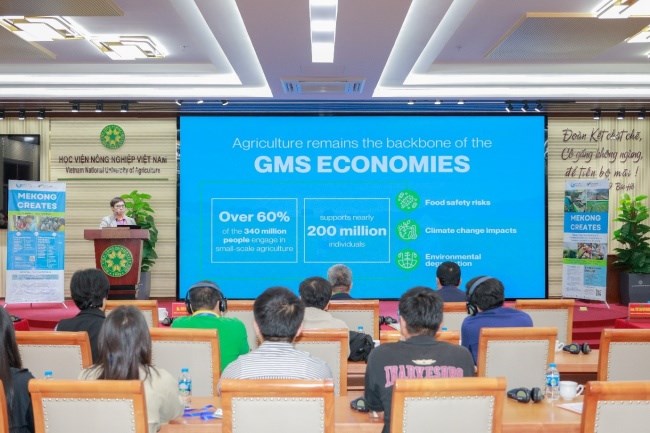
Dr. Orn-uma Polpanich delivering the opening remarks
Representing VNUA, Assoc. Prof. Dr. Pham Van Cuong, Vice President of the University, reaffirmed VNUA’s leadership in research, education, and innovation for sustainable agriculture. He highlighted VNUA’s contributions to food safety, sustainable livestock systems, and climate-smart agriculture, in line with the One Health approach connecting human, animal, and environmental health.
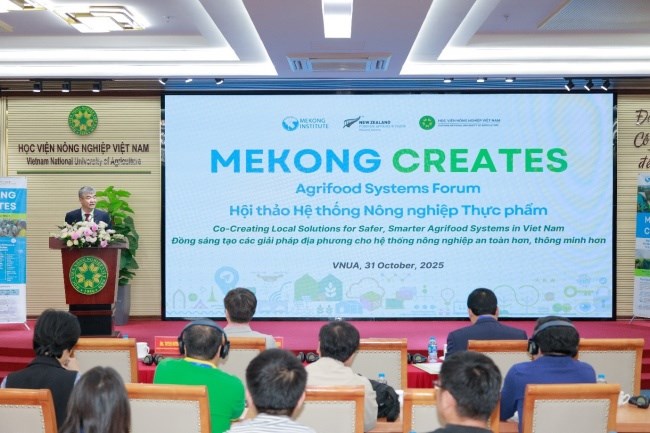
Assoc. Prof. Dr. Pham Van Cuong, Vice President of Vietnam National University of Agriculture
From a policy perspective, Mr. Ta Van Tuong, Deputy Director of the Hanoi Department of Agriculture and Environment, presented directions for developing green, circular, and high-tech agriculture, noting that “smart agriculture is not just about technology adoption, but about transforming mindsets: placing people, the environment, and local values at the center.”
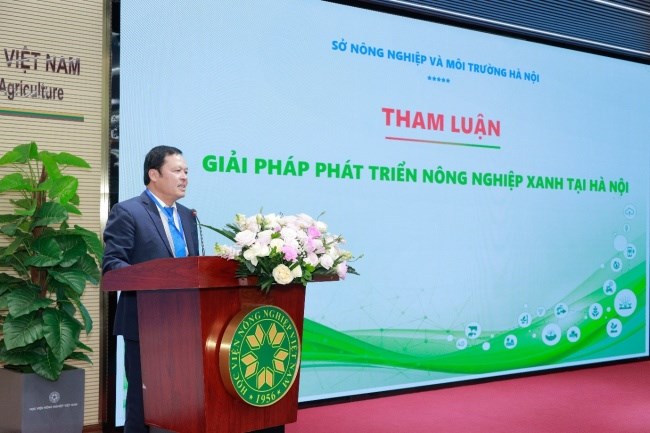
Mr. Ta Van Tuong delivering the keynote address
Adding a regional lens, Ms. Huynh Thi Thanh Tuyen, Asia Lead for Food Environments and Consumer Behavior at the Alliance of Bioversity International & CIAT, discussed food systems transformation and healthy diets, stressing the importance of aligning policies and community actions around nutrition, health, and environmental sustainability.
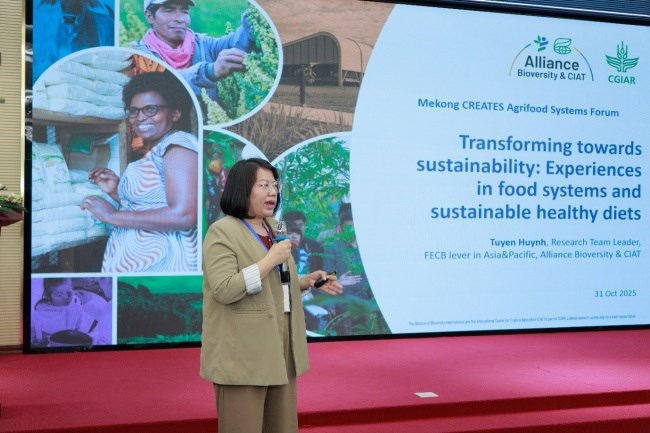
Ms. Huynh Thi Thanh Tuyen sharing her presentation
The “Stories and Solutions from the Field” session inspired participants through practical innovations and local success stories:
Mr. Lai Van Song, CEO of DFARM Organic, introduced AgriUps, a bioenergy regeneration model for smart farming;
Ms. Lan TTN, founder of AnTo Tea - Hibiso, shared her journey in building a hibiscus tea ecosystem that empowers women and marginalized groups;
Mr. Phan Trung Kien, CEO of SADU, presented experiences in developing circular agriculture through e-commerce;
and Dr. Nguyen Van Nhien, former Deputy Chief Inspector of the Ministry of Health, provided updates on Vietnam’s two-tier food safety inspection system.
These stories showcased the creativity and commitment of entrepreneurs and communities in realizing sustainable, smart, and inclusive agricultural practices.
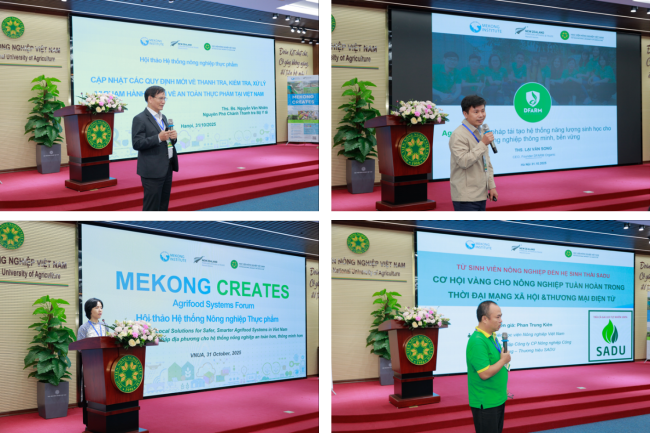
Speakers presenting their innovations during the session “Stories and Solutions from the Ground”
During the “Circle of Cooperation” session, participants engaged in three thematic groups:
Food Safety & One Health - linking food safety with public health and risk governance;
Smart Agriculture - exploring digital transformation and technology application;
Climate & Community - focusing on climate adaptation and resilient livelihoods.
The discussions identified institutional priorities, coordination needs, and actionable pathways for collaboration among academia, government, private sector, and communities, reflecting the spirit of co-creation and collective action central to Mekong CREATES.
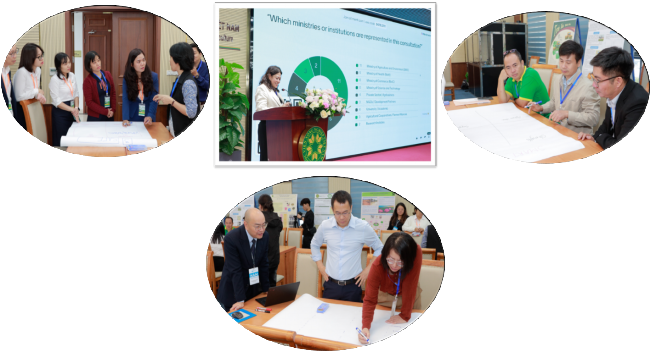
Participants engaging in group discussions during the Circle of Cooperation.
In her closing summary, Dr. Orn-uma Polpanich highlighted the forum’s key insights from policy directions on green agriculture and regional perspectives on healthy diets to innovative models such as AgriUps, Hibiso, and SADU.
She commended VNUA’s leadership in fostering partnerships that bridge research, policy, and practice, and reaffirmed MI’s commitment to sharing the outcomes through the Mekong CONNECT & CREATES Community of Practice, contributing to a safer, smarter, and more inclusive agrifood.
The forum concluded in an atmosphere of warmth, collaboration, and shared optimism for a greener, cleaner, and more resilient agricultural future, where local innovations take root and inspire regional transformation.
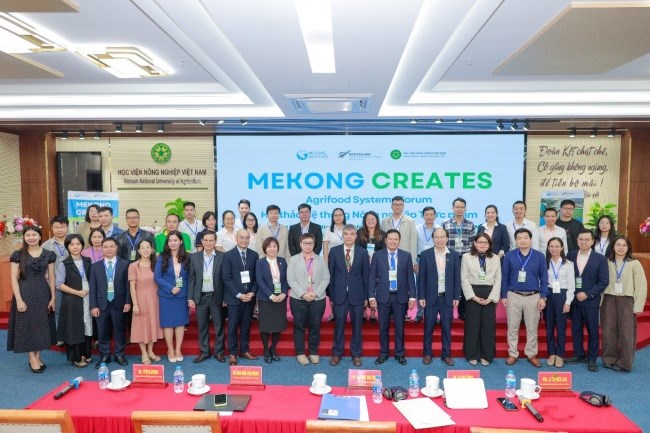
Group photo of speakers and participants
Microbiology and Food Safety Research Group, VNUA